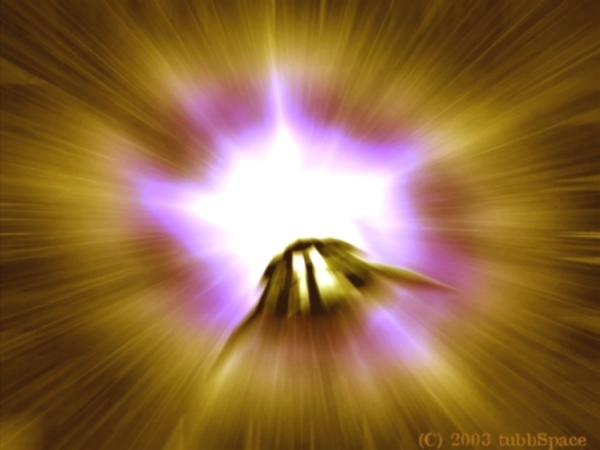
Why Play Starquest?
This is a game about space fantasy, not science-fiction. They are two completely different genres. Rather than focus on the technical aspects of how things work or why they work, this game spends its rules, rolls, pages and playtime developing drama, characters, and high adventure! Unfortunately, the movies, television shows and novels upon which most other space RPGs are based seldom take into account their own theme. Instead of focusing on what made their source material popular enough for a game in the first place, they all follow the cookie-cutter format of whatever game rules the marketplace at the time they're made. This game, on the other hand, like a certain space fantasy film that came out in 1977, defies all the conventional rules of the marketplace with the same philosophy as that film's director. To paraphrase George Lucas, in regards to other RPGs: "You're doing it wrong. Games can be made better than this."
With the universe of Lucas as the main inspiration for this game, we set out to make a game that is simply fun. It does not take itself seriously. It has the depth of any true mythology but the whimsical style of the classic films and fantasy games that made this industry so popular. The core rules don't waste page space and thus playtime overdeveloping the ins and outs of the sciences. After all, this is not a detective game, and while most 'sci-fi' games lay claim to the action of shows that share their name, they end up being courtroom games none-the-less, arguing details and rules rather than getting on with the action! This game on the other hand is designed to create cliffhangers, heroes, villains, and aliens from a thousand worlds!
We feel that the two genres of space opera and science-fiction really need to be clearly defined, and perhaps even a rift made between them. This game, hopefully, will help clarify things by allowing gamers a chance to experience what they have really been missing. And the best way to begin this rebellion is to reveal just where the CORPORATE EMPIRE has choked the life out of the gaming universe and clarify what freedom and fun has been lost in the merchandising machine, indeed to explain just how this game works where others merely advertise their greatness.

Picture by Andrew Kyle Tubbs
Common: To have an alien character, one has to choose from the alien races that were made up for the rulebook. Usually, these are cheap attempts to simulate popular races they have no copyright for, or even if they do have the license, they do not pay attention to the details that we as fans know. Nothing creates arguments or disappointment quicker than something which should be canon like a rulebook getting our beloved space mythos incorrect, in letter or in spirit. And then, either to fix such a situation or to include a race forgotten by the rules, the player has to enter into negotiations with his GM, and as we know, compromises leave everybody unsatisfied.
Starquest: Rather than have limited races to choose from, we don't have any! After all, why try? They'll either be 'wrong' in the eyes of the Players, or next week some kick-ass movie will come out which has a new race that is thus not in the game. Instead, this game provides a list of racial 'Features' which one can acquire by Creation Points, and so he can always create any race he wants, exactly how he wants it to be, based on his perception and preferences rather than those of somebody else. Furthermore, space fantasy is always including a character in the party that is some human actor with varying quality of makeup, which is only used in one story and never seen again, and the game should reflect that, as an infinite variety of PC races become available. This system allows one to create any such race without any Player-GM negotiations needing to take place, thus not costing the creative Player or role-player concessions down the line. Seriously, why should asking for a tall, hairy Character with a crossbow be any different than a smuggler? It's space fantasy! But in a common RPG, if that tall, hairy race wasn't there, it would cost the Player credibility with the GM and his perfectly thought-out Campaign. Not in this game!
Common: You have to choose from ships on the lists. 'Nuff said.
Starquest: Space fantasy, as with its alien races and robots, always has an infinite variety of spaceships, usually because the low-budget shows we love that they're based on use models and cheap-ass props. However, this forces creativity, and now this same creativity shines through in an RPG inspired by those same shows! As with aliens and other races, one does not have 'Character Class cookie-cutter vehicles' here, but makes his own up, building details as if his ship were a Character in itself. This makes ships unique, indeed becoming personal to the Players as they would to the Characters.
Common: Maps are still slowing everything down. Maps of entire space ships and space stations and even planets. Yet space fantasy is so often based on movies, which fly by scene-to-scene, that all the mundane details of the ships and stations and alien worlds are never seen. Yet in most RPGs, still being tactical games struggling to evolve into story-games, the players are forced to find their way through hundreds of miles and playing hours of rule-quagmires and endless mapping just to find one thing that is fun and exciting. In other words, maps make a game boring.
Starquest: No maps! The Adventure's narration summarizes the mundane times of the journey and jumps ahead to the next 'scene', as would a movie. Indeed, like hyperspace travel, this game moves at lightspeed with rules and maps. Why travel between the stars with fossil fuel? Why not just skip the vast reaches of space and get where the hell you're going? Why map hundreds of empty rooms? Why not have the Adventure worry about that and just take you from one exciting moment to the next? Well, that's exactly the journey you'll get if you climb aboard this piece of junk that makes 0.5 past gamespeed.
Common: Count your bullets. Ho-hum. Yawn yawn yawn . . .
Starquest: Movie guns! They keep on firing until you roll a Critical Miss with the 'empty weapon' result. After all, in a high-tech universe, why should laser pistol clips adhere to the proportions of our current ballistic handguns? They could hold hundreds of shots! Like in a movie, this game doesn't worry about counting shots. Cheesy, sure, but a lot more fun than being in a real-life confrontation with your 'friends' over tactics and trivial details. After all, the number of shots you have left isn't what's important. Hitting the bad guy in the big black suit and helmet seated at the end of the dinner table is! Go ahead and blaze away without worrying about it. Now that's an adventure!
Common: You're locked into playing the mythology of the game's title. If you have a great rule system but it's not of the movie-mythos you love, you have to work your butt off to convert things, and then you have to convince your current group and any new players that come along that your ideas are the best. Wouldn't it be easier and thus more fun to have a game system that applies to any mythos?
Starquest: This game is applicable to everything. It includes the classic elements of all known mythologies, so it can be a lot more easily adapted to any story or universe you like to play in (of course, we had to change a few names to avoid being sued, but what can ya do?) Rather than trying to sell itself on a name brand, this game sells itself on playability! Wow, what a concept! A game that works, and in any galaxy you want it to. For example, the game of 'Dungeons & Dragons' can be used to play in any medieval fantasy world, as its title and rules are pretty universal. Space games, unfortunately, seem to pick a single franchise and make rules for that license alone. This game, one might say, is the 'D&D of space'.
















